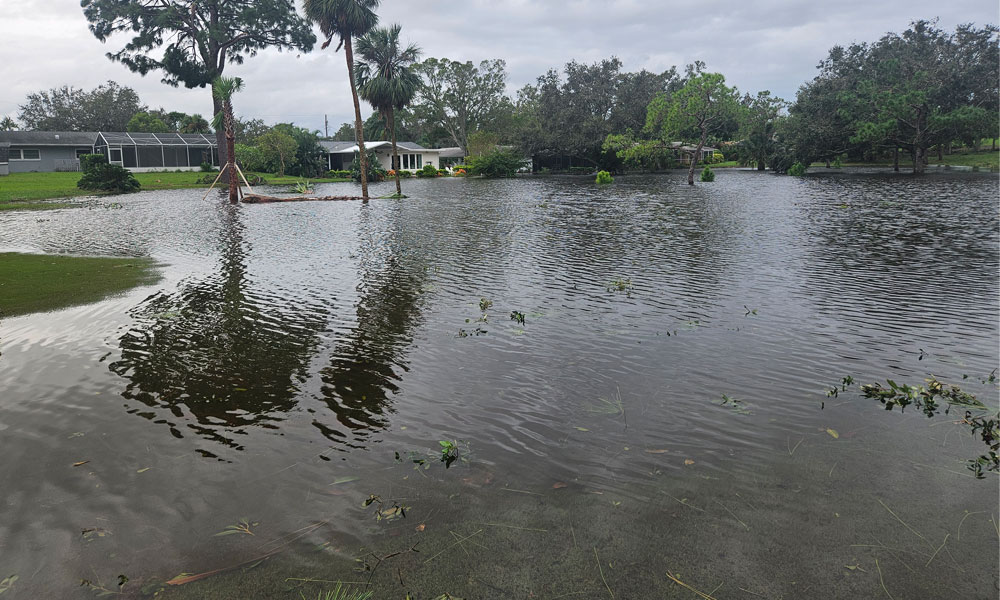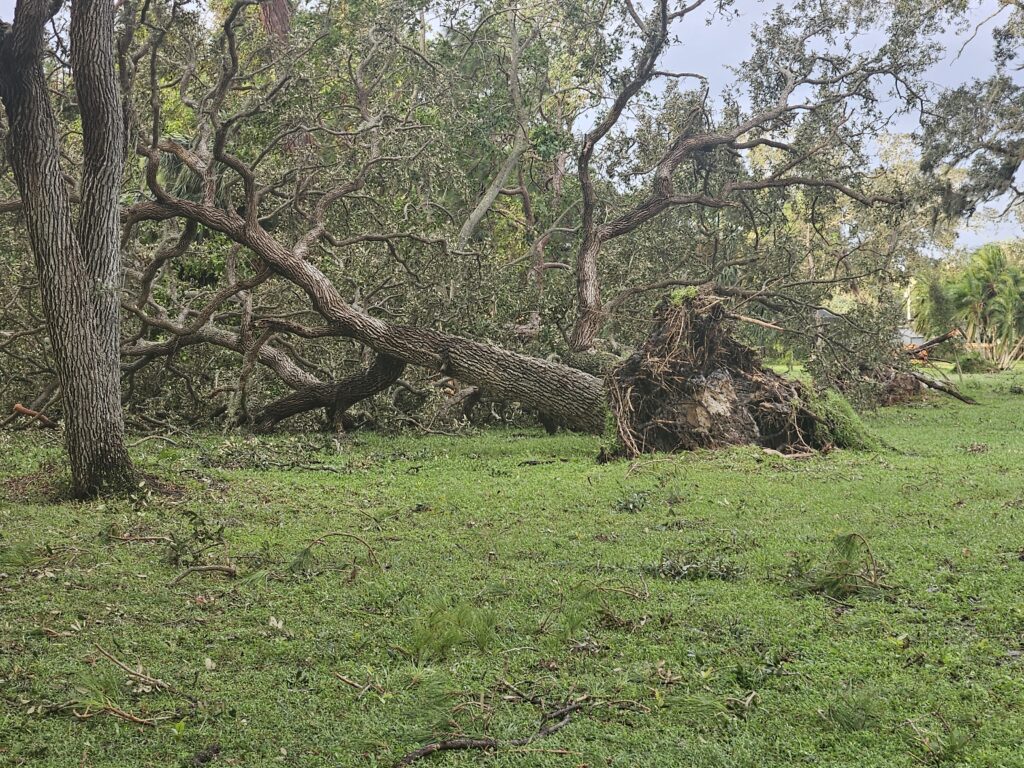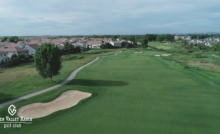Dunedin GC Post-Hurricane Update & Winterizing a PNW Golf Course: Making the Rounds – Installment 34


Damage from Milton to Dunedin GC and Nearby Homes
This column features recollections of the author’s 37 years as a golf writer. These installments stem from his many travels and experiences, which led to a gradual understanding that the game has many intriguing components, especially its people.
Instead of gearing up for another busy season in the Southeast, many superintendents are struggling to overcome the rampant damage wrought by two major hurricanes, Helene and Milton.
These back-to-back disasters started with Category 4 Helene in late September. It walloped the region – especially inland – with over 20 inches of rain, massive flooding, and sustained winds over 140 mph.


Two weeks later, Milton barreled across the Gulf of Mexico toward Florida’s west-central coast as a Category 4 storm. It brought sustained winds of 155 mph, just 1 mph below a Category 5 hurricane. But that’s splitting hairs as the National Weather Service in Tampa Bay described Milton as “a historic storm for the west coast of Florida and possibly the worst to hit the area in over a century.”
Perhaps lost in these numbers is the powerfully damaging coastal storm surges wrought by both hurricanes. Helene’s surges were upwards of 10 feet, killing 12 people in the Tampa area.
Before Milton reached land, a former director of FEMA noted ominously, “This isn’t water that rises slowly. This is fast-moving water with waves. It’s like a battering ram,” Craig Fugate of Florida said. “You just don’t want to be in that area. That’s how we lost a lot of lives in all those surge areas where people didn’t get out. They either drowned or were crushed by their houses collapsing on them.”
The hurricanes heralded a challenging golf season for many course superintendents in this part of the U.S., not to mention threatening millions of residents. In addition, courses midway through remodeling projects now must cope with significant upheavals in their schedules.
Among these is the restoration of the Donald Ross-designed Dunedin Golf Club in the Tampa area. It was covered in June 2024 in a two-part series of “Making the Rounds” columns: The Rebirth of Dunedin Golf Club (Part 1): Making the Rounds – Installment 31 and The Rebirth of Dunedin Golf Club (Part 2): Making the Rounds – Installment 32.
Originally slated for a grand opening in mid-October 2024, the dual hurricanes shoved that date tentatively to December.
I followed up with my old friend, Blair Kline, General Manager of Golf Operations for the City of Dunedin, for course updates after Helene and Milton struck the area. Here are Blair’s honest – and sometimes wry – reports back to this writer in Washington State. By the looks of things, Dunedin GC’s superintendent Dennis Swander and his crew have their hands full.
September 30 – after Helene landed:
“Not great timing for us but at least we hadn’t just sprigged! Just across the street many homes were totaled from the storm surge. We got 80-mph gusts (lots of smaller limbs down) but only 1.75 inches of rain.
“The storm surge was considerable, with damage along the coast and Barrier Islands in the Tampa area. We had water covering holes 12, 13, 14, 17 from the storm surge. Additionally, 11 and 14 greens had water on them and 15, 17 were submerged.
“We immediately vented/flushed the greens and applied Verde-Cal K Plus, so hopefully we get some color and growth back. Too early to tell but might have to push our grand opening to a ribbon-cutting on November 9. We fared much better than homes in the area that were totaled.
“Hope all is well in sunny Seattle!”
October 1 – after a closer assessment of Helene’s toll:
“The peak of the storm surge was 11 pm. (Photographer Walt Kozikowski] is about 6 feet tall and the water would have been around his neck, so no pictures – it wouldn’t have been safe to be outside. By daylight the water had gone down quite a bit. Pretty much every community along the coast from St. Petersburg to landfall up by Tallahassee was affected.
“Still power outages here and the cleanup starts. Lots of Gulf-side restaurants will probably never rebuild.”
October 7 – on the eve of Milton’s arrival…
… and its potentially stronger punch to greater Tampa than Helene. Kline shows his trademark humor with a reference to an old comic (Milton Berle), which this fellow septuagenarian appreciates.
“Uncle Miltie! Looks bad if as forecasted, might be lucky to open November 15th.
“You can freeze in Washington, but no hurricanes!”
October 9 – Dire Warnings
Mayor Jane Castor warned residents of Tampa (which, incredibly, had not been directly bit by a major hurricane in 103 years) about 15-feet storm surges possibly swallowing an entire house: “So if you’re in it, basically that’s the coffin that you’re in,” she said.
October 16 – Post-Milton Update
Blair described the damage after the second straight severe hurricane swept across Dunedin.
“These pics are after Milton,” Kline said of the accompanying photos in this story. “Milton is the one that caused us the most wind damage.
“I talked with [veteran Virginia-based public relations’ rep] Dan Shepherd, and he said Mississippi was a client of his when Beau Rivage opened Fallen Oak in late August 2005. That $33 million course opened August 31 when Hurricane Katrina hit. They spent another $17 million to get it to how they wanted before reopening. We will beat this [cost] and open one month later than expected, unless we get any more severe weather.
“We have had buzzard’s luck so far. Started construction in a drought when water was scarce. It felt like a desert with blowing wind and sand. But then it started raining, which slowed down construction.
“So instead of opening the course at the end of October 2024, it was going to open November 1 because of Helene. Now thanks to ‘Uncle Miltie’ that date will probably be pushed to December 1.
“This involves not only more money being spent, but a month of revenue not realized. Thanks, Blair.”
Disaster Relief
Golf operators and superintendents should be aware of the GCSAA Disaster Relief Fund to assist GCSAA members who suffer personal loss from natural disasters. It was established in 2006 in response to Katrina. The fund is a resource for members who face tragedy caused by natural disasters. Those who are affected and may be eligible for financial assistance and resources from the fund can contact 800-472-7878 or email membership.help@gcsaa.org.
[Special thanks again to Walt Kozikowski for the above post-hurricane photos. To watch videos of this project’s timeline and evolution, with Blair Kline as the presenter, search “DGC Restoration” on YouTube.]
Meanwhile, on the Opposite Side of the Continent is the Usual Winter Prep
Out in the comparatively benign Pacific Northwest, golf course superintendent Blane Hezel is prepping Useless Bay Golf & Country Club on Whidbey Island for another winter. This rite of autumn is being pursued by superintendents entering their typical off-season. The conditions here are nowhere near as wet and wild as Florida. Despite Kline’s comment, western Washington’s moderate climate doesn’t produce much snowfall and, when it does come, usually melts quickly.
But with colder temperatures always a possibility, the fall months are mainly a period of prepping for possible catastrophes like freeze-caused broken irrigation and drainage lines, falling trees, turf issues, and the invasions of vermin and plant diseases. But it’s nothing compared to the wholesale damage inflicted by tropical cyclones dumping over 2 feet of rain, uncontrollable storm surges, winds exceeding 150 mph, and many deaths.
Below is a sampling of items on Hezel’s fall 2024 punch list. This year he’ll be juggling normal crew tasks with preparations for the installation of an all-new, member-approved irrigation system in spring 2025.
- Repair collar dams on 17, 18, 5
- Install drainage – driving range, 16, 15, 6-R, 9, RIGHT of 10 (delay because of irrigation system?)
- Incorporate walk-offs from the tees
- Increase more native areas – control weeds
- Repair cart paths
- Develop as-built program for underground infrastructure
- Program to spray weeds throughout the golf course
- Paint restrooms
- Flail-mow ditch lines
- Re-align tee complexes
- Paint kiosks at #1 and #10 tee complex
- Prep new “Green” [front] tees to be playable next year
- Clean/organize Maintenance Facility
- Tree removal right of 14 green and left of #4 rough ditches
- Continue to implement UBGCC Improvement Plan.
Hezel will try to accomplish these – and many other tasks – with a limited crew on a rural island. Let’s hope he won’t have to face any unforeseen natural calamities, though those are always a possibility for a golf course superintendent anywhere on this planet.
Jeff Shelley has written and published 10 books as well as numerous articles for print and online media since 1987. Among his titles are three editions of the book, “Golf Courses of the Pacific Northwest.” The Whidbey Island resident was editorial director of Cybergolf.com from 2000-15, co-founder of the Northwest Golf Media Association and president of the nonprofit First Green (https://www.thefirstgreen.org/). To contact Jeff: fairgreens@seanet.com.
Recent Posts
Coxreels® Exceeds Industry Recommended Salt Spray Testing Hours
Due to its numerous properties and, specifically, its corrosion resistance, powder coating is used for…
Advanced Turf Solutions and Arborjet | Ecologel Announce Strategic Partnership
Advanced Turf Solutions (ATS) is pleased to announce a new strategic partnership with Arborjet |…
BRANDT Expands Cup Format For Superintendents in Florida
The Florida Golf Course Superintendents Association proudly announces an extension and expansion of its successful…
The Rare Condor: What It Means for Golf and the Course Maintenance Behind It
Imagine this: you're on a par-5, having just hit your shot toward the green. You…
DENIOS Under Bench Cabinet Provides Safe Storage of Lithium-Ion Batteries
DENIOS introduces asecos under bench cabinets for the safe storage of undamaged lithium-ion batteries. They…
True Blue Golf Club, One of America’s Top 100 Resort Courses, Acquires Steve Dresser Golf Academy
True Blue Golf Club has acquired the Steve Dresser Golf Academy, a renowned instructional facility…

